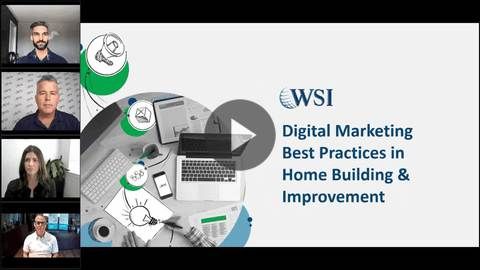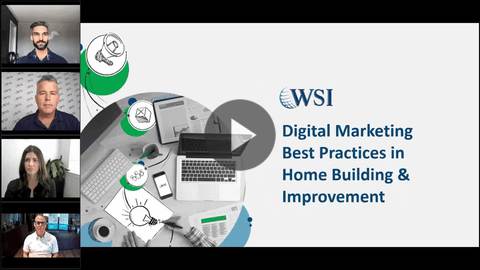Digital Marketing Best Practices in Home Building from Expert Panel

Summary: This panel of digital marketing experts shares best practices for home building and improvement businesses.
Tips and strategies to apply to your businesses for digital marketing can be complex when your forte is building homes rather than building an online presence. Thankfully, the WSI network is full of experts in this space, and in our latest Expert Panel Discussion, they discuss some digital marketing best practices home builders need to know. We’ve put together this blog post to summarize our speakers’ top digital marketing recommendations.
Our expert panelists are:
- Denise Bowen – WSI Certified Agency and member of several marketing committees for numerous home building associations;
- Usman Amjad – WSI Paid Search Associate Director and PPC expert;
- Jason Gervais – WSI Certified Agency and veteran of the home building and improvement field.
Some Home Building and Improvement Stats
In case you’re unfamiliar with this vertical, here’s what you need to know about this space when it comes to marketing:
- 53% of home builders said generating traffic and leads was their top marketing challenge.
- 42% of home builders didn’t know which marketing approach gave their organization a higher return on investment.
- 88% of consumers trust online reviews as much as they trust personal recommendations.
- 53% of buyers start their search online to solve all their home building needs.
This space needs digital marketing support and expertise to ensure that their marketing budgets are being spent wisely and lead to strong ROI.
Common Challenges for Home Building and Home Improvement Business Owners
Many contractors are exceptional at their trade, which leads them to open their own business. However, not all of these business owners are familiar with digital marketing and how having a digital marketing strategy can work for them.
Many of our home building and improvement clients also battle to land their ideal clients. Improving the quality of leads starts with pinpointing the right keywords and search phrases to appeal to the audience that brings in the type of work our clients want. Our experts recommend that home builders be clear about what makes them stand out (price, quality, speed, etc.) from the competition in a flooded market.
In such a seasonal industry, home building and home improvement clients may find it hard to scale staff to meet demand. Our experts recommend using marketing automation to save staff-hours and offer immediate engagement with prospective and current clients. Especially during the busy season, when owners are on job sites, automated lead handling creates an excellent first impression.
Additionally, automation helps manage the flow of inquiries by pre-qualifying leads with fields and forms to filter them.
Keys to Successful Marketing Campaigns
Our experts recommend home building and home improvement clients speak to their target audience with content and video which represents who they want to work with and what kind of work they want to do. It must be obvious which types of projects your business specializes in. And in such a visual industry, business owners need to make sure they have high-resolution, high-quality photos to showcase their work.
Because this is a sector where competition is ever-increasing, home building businesses can stand out with online word-of-mouth. It’s critical these businesess have an ongoing strategy to get high online reputation ratings and updated reviews.
Stipulate the purpose of each online marketing campaign (such as lead generation vs. brand awareness) because that makes all the difference in the approach. This allows business owners to focus on high impact, quality content (text, videos, images) that highlights their Unique Selling Proposition (USP) and differentiates their company.
Another recommendation is that home building and home improvement clients have systems to measure how much website traffic they’re getting and how this traffic is landing at their door. Measure what your visitors are looking at, what they are looking for, their activity levels, and what the actual conversion rate is.
Clients should define their messaging and strategy before jumping into paid search so that they can concentrate on high value, high revenue transactions. Use tools such as Google’s in-market audience targeting and custom intent audiences to find people currently researching home building and home improvement solutions.
Enriching educational content is a powerful tool that can be used to nurture relationships throughout the decision-making process. Purchasing a home or engaging in a home improvement project is a considered purchase, so the buyer’s journey will be slower. Strong content that can be slowly dripped to potential customers, such as guides and brochure downloads, will allow home building businesses to capture prospect’s details and add them to their database for email and social media marketing.
Make your CTA clear at every step of the way.
Latest Trends in Home Building
Our experts see that the use of longtail keywords and innovative PPC (in conjunction with the rest of your marketing efforts) is generating the best results for their home building clients. They recommend that business owners don’t try to market all of their services at once – focus on one set of keywords per campaign.
Our experts recommend looking into a more client-involved way of working, e.g., a digital portal to track products, colors, progress photos, etc. A home builder’s online presence is their most important marketing tool. And with the impact of COVID-19, it will be essential to feature projects such as home offices and outdoor living spaces, which are more in-demand than ever before.
About WSI
For 25 years, WSI has provided digital marketing services and comprehensive marketing strategies to businesses of all sizes and across various industries. If you’d like to learn more, contact us, or watch the recording below:
About the Author
Rick spent 20 years in the insurance industry in finance, primarily developing reporting platforms for B & C stakeholders. His ability to speak to consumers of data (managers and analysts) and translate their needs to programmers led him to start his own digital marketing agency in 2004 to develop data driven solutions for business owners.
The Best Digital Marketing Insight and Advice
We are committed to protecting your privacy. For more info, please review our Privacy and Cookie Policies. You may unsubscribe at any time.
Don’t stop the learning now!



